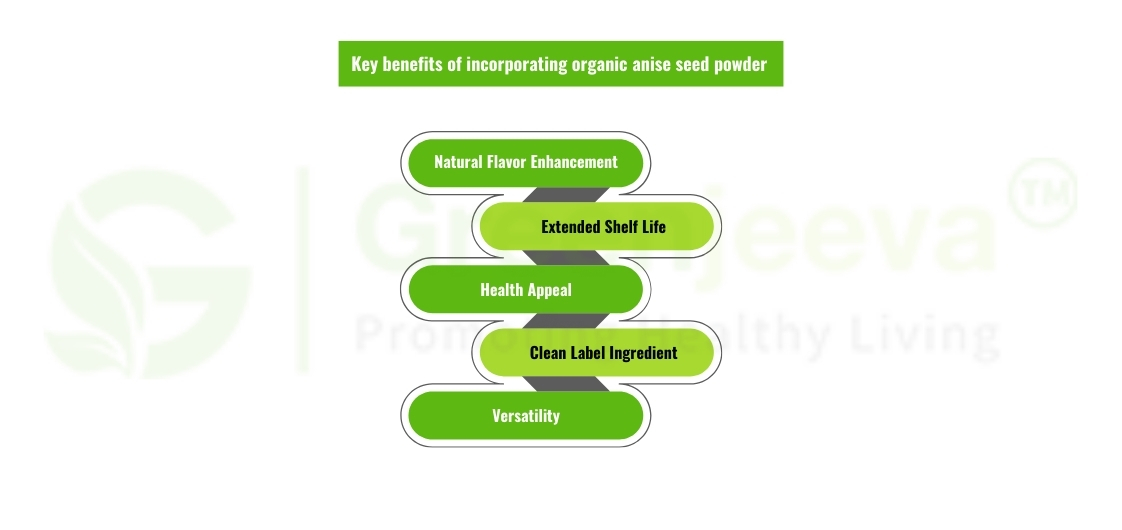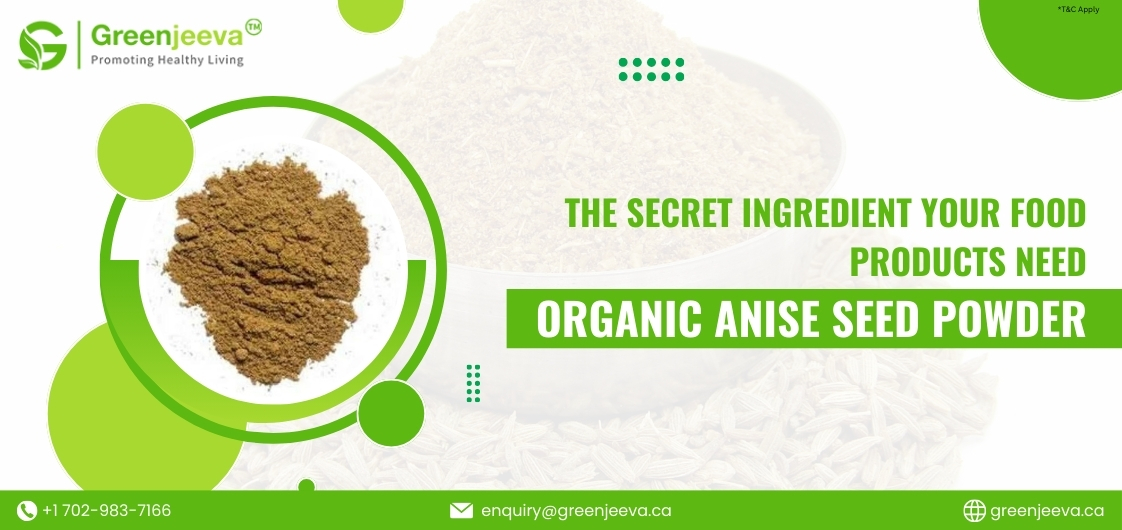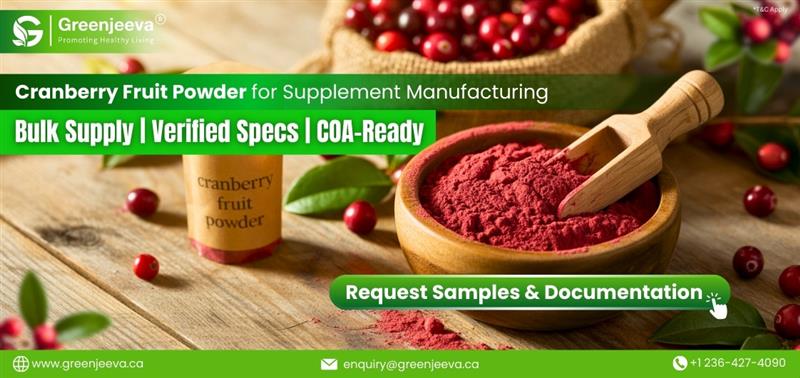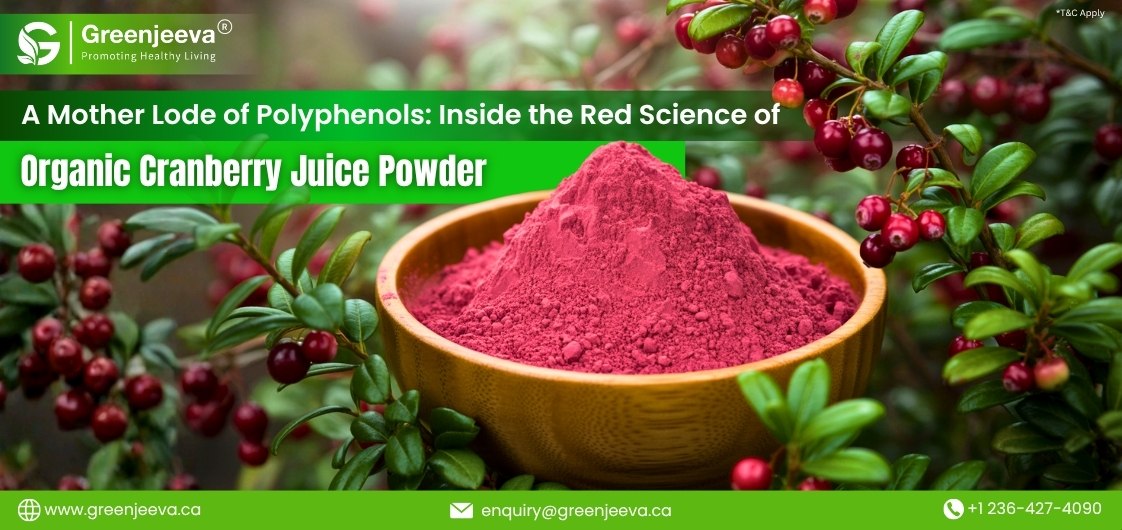Picture a spice revered since ancient times, now reimagined for modern food manufacturing. Organic anise seed powder is not just another ingredient—it’s a culinary chameleon quietly revolutionizing the food industry. From the subtle licorice notes in your favorite artisanal bread to the complex flavors in cutting-edge functional beverages, this versatile powder is leaving its mark on diverse products.
As consumers increasingly scrutinize labels and demand clean, natural ingredients, food manufacturers face a challenge: creating appealing, flavorful products that align with these evolving preferences. Organic anise seed powder emerges as a solution, offering a perfect blend of tradition and innovation. It’s an ingredient that doesn’t just add flavor—it tells a story of natural goodness and time-honored culinary wisdom.
But what makes this humble powder so special? And how can food manufacturers harness its potential to create products that resonate with today’s discerning consumers? Let’s delve into the organic anise seed powder world and uncover how it’s transforming the food manufacturing landscape.
Anise Seed Powder in Food Manufacturing
Organic anise seed powder offers many advantages for food manufacturers looking to enhance their products. Its distinct licorice-like flavor profile adds depth and complexity to various foods and beverages. Beyond taste, this powerful ingredient boasts impressive nutritional properties that align with today’s health-conscious consumers.
Recent market research indicates that the global anise seed market is expected to grow at a CAGR of 6.2% from 2021 to 2026, reaching $387.7 million by the end of the forecast period. This growth is primarily attributed to the increasing demand for natural flavoring agents and the rising awareness of anise seed’s health benefits.
Key benefits of incorporating organic anise seed powder into food products include:
1. Natural Flavor Enhancement: Anise seed provides a unique, sweet-spicy flavor that can elevate food products without artificial additives.
2. Extended Shelf Life: Anise seed powder’s antimicrobial properties can help extend certain products’ shelf life, reducing food waste and improving profitability.

3. Health Appeal: Rich in antioxidants and various nutrients, anise seed powder can boost the nutritional profile of food products, appealing to health-conscious consumers.
4. Clean Label Ingredient: As an organic, single-ingredient powder, it aligns with the clean label trend, meeting consumer demands for transparent, easily understood ingredients.
5. Versatility: From baked goods to beverages, anise seed powder can be incorporated into a wide range of products, offering manufacturers flexibility in product development.
What is Anise Powder Used For?

Anise seed finds applications across various sectors of the food industry:
1. Bakery: It’s commonly used in cookies, cakes, and bread to impart a distinctive flavor.
2. Confectionery: Anise powder is a key ingredient in many candies and licorice products.
3. Beverages: It’s used to produce certain alcoholic beverages and herbal teas.
4. Dairy: Some manufacturers incorporate it into yogurts and ice creams for unique flavor profiles.
5. Meat Processing: Anise powder can be a natural flavoring in certain sausages and cured meats.
What is the Active Ingredient in Anise Seed?
The primary active ingredient in anise seed is anethole, an organic compound responsible for its characteristic flavor and aroma. Anethole comprises about 75-90% of anise seed’s essential oil. This compound has been studied for its potential health benefits, including anti-inflammatory, antimicrobial, and digestive properties.
Other notable compounds in anise seed include:
– Estragole
– Anise aldehyde
– Limonene
– Pinene
These compounds contribute to anise seed’s overall flavor profile and potential health benefits, making it a valuable ingredient in food manufacturing.
Choosing the Right Organic Anise Seed Powder Supplier
Selecting a reliable organic anise seed powder supplier ensures product quality and consistency. When evaluating potential suppliers, consider the following factors:
1. Organic Certification: Ensure the supplier holds valid organic certifications from recognized authorities.
2. Quality Control: Look for suppliers with stringent quality control measures and testing procedures.
3. Traceability: Choose a supplier that offers full traceability of their anise seed powder from farm to finished product.
4. Consistency: Opt for suppliers who can guarantee consistent flavor profiles and particle sizes across batches.
5. Sustainability Practices: Consider suppliers who prioritize sustainable farming and processing methods.
By partnering with a reputable anise seed powder supplier, food manufacturers can leverage the full potential of this versatile ingredient to create innovative, appealing products that meet evolving consumer demands.
In conclusion, organic anise seed presents a compelling opportunity for food manufacturers to enhance their product offerings. Its unique flavor profile, health benefits, and versatility make it an invaluable ingredient in today’s competitive market. As consumer interest in natural, organic ingredients continues to grow, incorporating organic anise seed powder into food products can provide a significant edge in meeting these evolving preferences.
**The Food and Drug Administration has not evaluated these statements. This product is not intended to diagnose, treat, cure, or prevent any disease.**








































